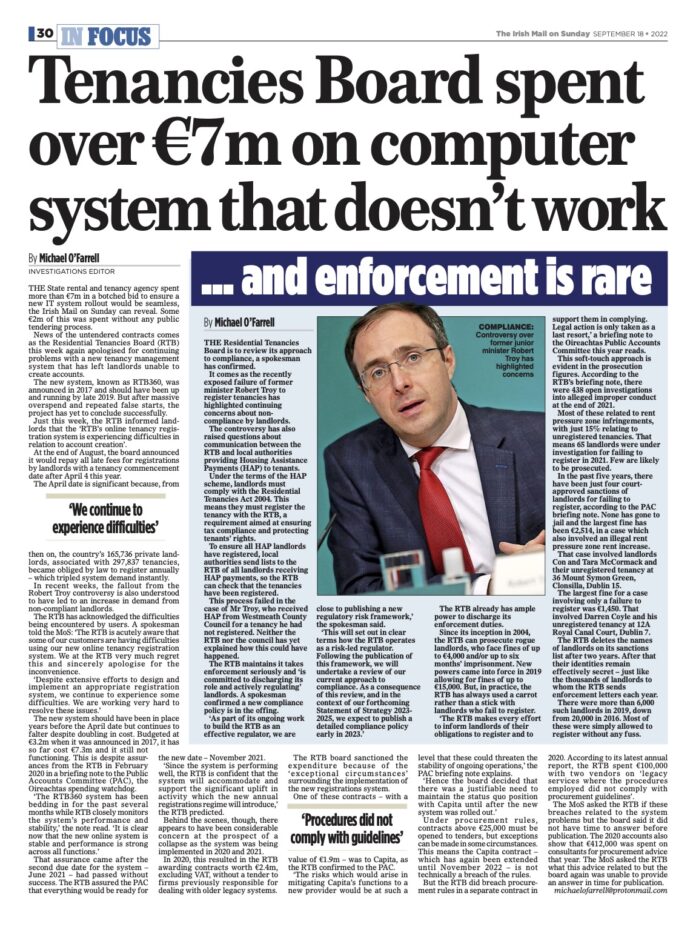THE State rental and tenancy agency spent more than €7m in a botched bid to ensure a new IT system rollout would be seamless, the Irish Mail on Sunday can reveal. Some €2m of this was spent without any public tendering process.
News of the untendered contracts comes as the Residential Tenancies Board (RTB) this week again apologised for continuing problems with a new tenancy management system that has left landlords unable to create accounts.
The new system, known as RTB360, was announced in 2017 and should have been up and running by late 2019. But after massive overspend and repeated false starts, the project has yet to conclude successfully.
Just this week, the RTB informed landlords that the ‘RTB’s online tenancy registration system is experiencing difficulties in relation to account creation’.
At the end of August, the board announced it would repay all late fees for registrations by landlords with a tenancy commencement date after April 4 this year.
The April date is significant because, from then on, the country’s 165,736 private landlords, associated with 297,837 tenancies, became obliged by law to register annually – which tripled system demand instantly.
In recent weeks, the fallout from the Robert Troy controversy is also understood to have led to an increase in demand from non-compliant landlords.
The RTB is acutely aware that some of our customers are having difficulties
RTB Spokesperson.
The RTB has acknowledged the difficulties being encountered by users. A spokesman told the MoS: ‘The RTB is acutely aware that some of our customers are having difficulties using our new online tenancy registration system. We at the RTB very much regret this and sincerely apologise for the inconvenience. ‘Despite extensive efforts to design and implement an appropriate registration system, we continue to experience some difficulties. We are working very hard to resolve these issues.’
The new system should have been in place years before the April date but continues to falter despite doubling in cost. Budgeted at €3.2m when it was announced in 2017, it has so far cost €7.3m and it still not functioning. This is despite assurances from the RTB in February 2020 in a briefing note to the Public Accounts Committee (PAC), the Oireachtas spending watchdog.
‘The RTB360 system has been bedding in for the past several months while RTB closely monitors the system’s performance and stability,’ the note read. ‘It is clear now that the new online system is stable and performance is strong across all functions.’
That assurance came after the second due date for the system – June 2021 – had passed without success. The RTB assured the PAC that everything would be ready for the new date – November 2021.
‘Since the system is performing well, the RTB is confident that the system will accommodate and support the significant uplift in activity which the new annual registrations regime will introduce,’ the RTB predicted. Behind the scenes, though, there appears to have been considerable concern at the prospect of a collapse as the system was being implemented in 2020 and 2021.
In 2020, this resulted in the RTB awarding contracts worth €2.4m, excluding VAT, without a tender to firms previously responsible for dealing with older legacy systems.
If you have information about matters of public interest within the Residential Tenancies Board contact michaelofarrell@protonmail.com in complete confidence.
The RTB board sanctioned the expenditure because of the ‘exceptional circumstances’ surrounding the implementation of the new registrations system. One of these contracts – with a value of €1.9m – was to Capita, as the RTB confirmed to the PAC.
‘The risks which would arise in mitigating Capita’s functions to a new provider would be at such a level that these could threaten the stability of ongoing operations,’ the PAC briefing note explains.
‘Hence the board decided that there was a justifiable need to maintain the status quo position with Capita until after the new system was rolled out.’
Under procurement rules, contracts above €25,000 must be opened to tenders, but exceptions can be made in some circumstances. This means the Capita contract – which has again been extended until November 2022 – is not technically a breach of the rules.
But the RTB did breach procurement rules in a separate contract in 2020. According to its latest annual report, the RTB spent €100,000 with two vendors on ‘legacy services where the procedures employed did not comply with procurement guidelines’.
The MoS asked the RTB if these breaches related to the system problems but the board said it did not have time to answer before publication. The 2020 accounts also show that €412,000 was spent on consultants for procurement advice that year. The MoS asked the RTB what this advice related to but the board again was unable to provide an answer in time for publication.
… and enforcement is rare
THE Residential Tenancies Board is to review its approach to compliance, a spokesman has confirmed.
It comes as the recently exposed failure of former minister Robert Troy to register tenancies has highlighted continuing concerns about noncompliance by landlords.
The controversy has also raised questions about communication between the RTB and local authorities providing Housing Assistance Payments (HAP) to tenants.
Under the terms of the HAP scheme, landlords must comply with the Residential Tenancies Act 2004. This means they must register the tenancy with the RTB, a requirement aimed at ensuring tax compliance and protecting tenants’ rights.
To ensure all HAP landlords have registered, local authorities send lists to the RTB of all landlords receiving HAP payments, so the RTB can check that the tenancies have been registered.
As part of its ongoing work to build the RTB as an effective regulator, we are close to publishing a new regulatory risk framework
RTB Spokesperson.
This process failed in the case of Mr Troy, who received HAP from Westmeath County Council for a tenancy he had not registered. Neither the RTB nor the council has yet explained how this could have happened.
The RTB maintains it takes enforcement seriously and ‘is committed to discharging its role and actively regulating’ landlords. A spokesman confirmed a new compliance policy is in the offing.
‘As part of its ongoing work to build the RTB as an effective regulator, we are close to publishing a new regulatory risk framework,’ the spokesman said.
‘This will set out in clear terms how the RTB operates as a risk-led regulator. Following the publication of this framework, we will undertake a review of our current approach to compliance. As a consequence of this review, and in the context of our forthcoming Statement of Strategy 2023-2025, we expect to publish a detailed compliance policy early in 2023.’
The RTB already has ample power to discharge its enforcement duties.
Since its inception in 2004, the RTB can prosecute rogue landlords, who face fines of up to €4,000 and/or up to six months’ imprisonment. New powers came into force in 2019 allowing for fines of up to €15,000. But, in practice, the RTB has always used a carrot rather than a stick with landlords who fail to register.
‘The RTB makes every effort to inform landlords of their obligations to register and to support them in complying. Legal action is only taken as a last resort,’ a briefing note to the Oireachtas Public Accounts Committee this year reads.
This soft-touch approach is evident in the prosecution figures. According to the RTB’s briefing note, there were 438 open investigations into alleged improper conduct at the end of 2021.
If you have information about matters of public interest within the Residential Tenancies Board contact michaelofarrell@protonmail.com in complete confidence.
Most of these related to rent pressure zone infringements, with just 15% relating to unregistered tenancies. That means 65 landlords were under investigation for failing to register in 2021. Few are likely to be prosecuted.
In the past five years, there have been just four courtapproved sanctions of landlords for failing to register, according to the PAC briefing note. None has gone to jail and the largest fine has been €2,514, in a case which also involved an illegal rent pressure zone rent increase.
That case involved landlords Con and Tara McCormack and their unregistered tenancy at 36 Mount Symon Green, Clonsilla, Dublin 15.
The largest fine for a case involving only a failure to register was €1,450. That involved Darren Coyle and his unregistered tenancy at 12A Royal Canal Court, Dublin 7.
The RTB deletes the names of landlords on its sanctions list after two years. After that their identities remain effectively secret – just like the thousands of landlords to whom the RTB sends enforcement letters each year.
There were more than 6,000 such landlords in 2019, down from 20,000 in 2016. Most of these were simply allowed to register without any fuss.



